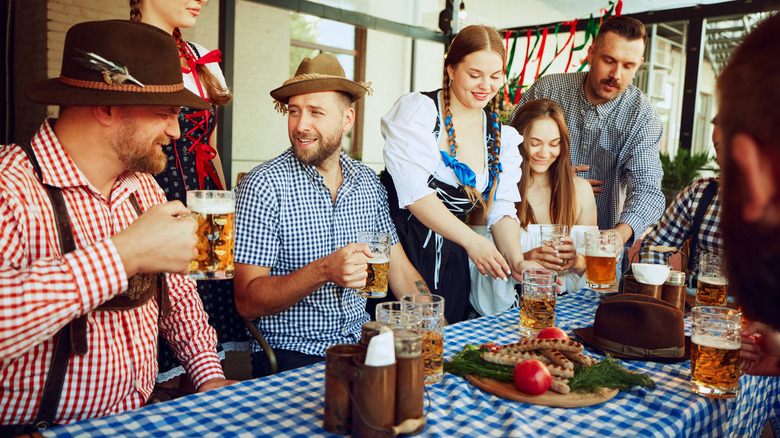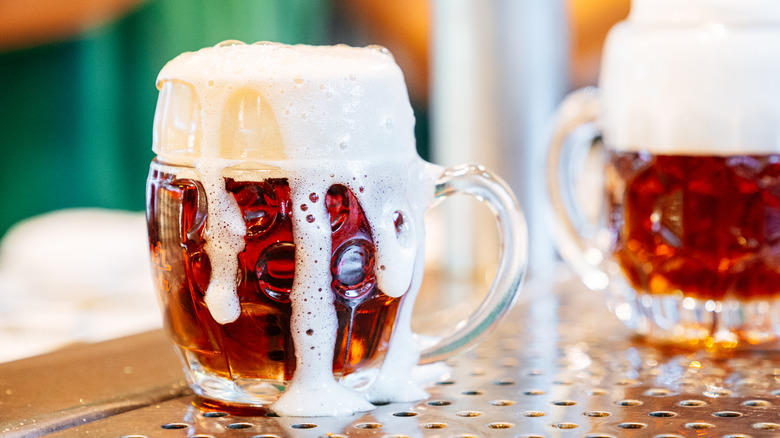Rumor has it that German beer causes milder hangovers (or magically, none at all, depending on who you ask). Those who make this claim say it’s due to Germany’s beer purity laws, which restrict the number of ingredients that can be added to beer. The idea goes that because German beer doesn’t have preservatives or other chemicals added, it won’t cause hangovers.
Unfortunately, this is probably false — German beer does indeed cause hangovers (if this wasn’t already evident by the numerous stories of Oktoberfest-related hangovers). Broadly speaking, it’s probably near impossible to create a hangover-free alcohol of any variety. Attempts to do so in the past have typically not actually worked.
For German beer, the country’s beer purity laws stipulate that beer can only be made with limited ingredients, meaning no preservatives like sulphur dioxide (often called sulfites). There’s a common misconception that such preservatives cause or worsen hangovers (whether they’re in beer, wine, or something else), but this is mostly false. While there’s a small segment of the population sensitive to preservatives like sulfites, they would experience something resembling an allergic reaction from consuming them, rather than an enhanced hangover.
What Germany’s beer purity laws actually mean
The German beer purity law, called the “Reinheitsgebot” in German, restricts beer makers to just hops, malt, yeast, and water. It’s been in place for over 500 years, and at present, is considered a useful way for Germany to preserve its various beer brewing cultures. However, the law isn’t without criticism — limited to just four ingredients, German brewers can’t get particularly creative, so there isn’t much of a craft beer market in the country. That said, there are workarounds, and brewers can make beers with other ingredients like fruit — they just can’t label them as beer. There are some anecdotal claims that Germany’s four-ingredient beers cause less of a raging hangover than sweeter or more artificially-enhanced beers of other countries, there’s no scientific proof to back this up and it might be a case of the placebo effect working its magic.
For one thing, while the laws do ensure a certain degree of consistency, they don’t really have a bearing on the quality of ingredients used. For example, if the wheat or hops are treated with pesticides, those chemicals could find their way into the beer (which has reportedly happened). The law also allows for a bunch of other products to be used in the production process, although they’re meant to be absent from the final product. For these reasons, some have criticized the purity laws as more of a marketing gimmick than a guarantee of quality.
How to avoid hangovers with German beer
Although German beers are certainly not hangover-proof, there are ways to approach drinking these beers (and beer in general) that can tame and temper your hangover. Staying hydrated and eating before or while you drink are good tips that apply no matter what type of alcohol you’re drinking.
One oft-repeated mantra about hangovers is that dark alcohols make them worse — and unlike the German beer myth, there is truth to this one. This is because dark alcohols tend to contain congeners, a compound that researchers suggest makes your body less effective at breaking down alcohol. As a result, dark alcohols tend to result in worse hangovers (and scientifically speaking, there is evidence that coffee can help treat them).
But if you want to avoid the hangover completely, skipping darker beers may be wise — in terms of the wide range of German brews, this includes varieties like Bockbier and Starkbier, as well as Altbier and Dunkel Lagers. Some of these also have higher alcohol levels, which unsurprisingly causes worse hangovers. You’re better off with the lighter varieties like Pilsner, Kölsch, and potentially Weizenbier or Helles, although pay attention to the alcohol content. Otherwise, there’s one other German cultural trait that may be useful — drinking in moderation, a surefire way to reduce or eliminate the prospect of that morning-after nausea and headache.

